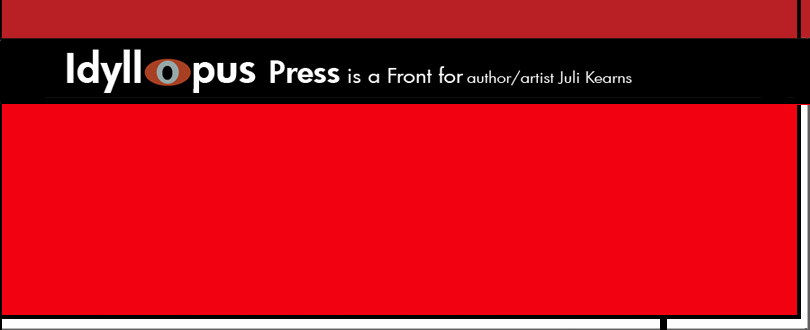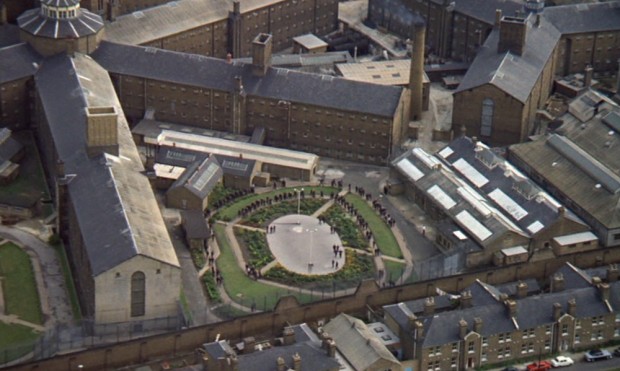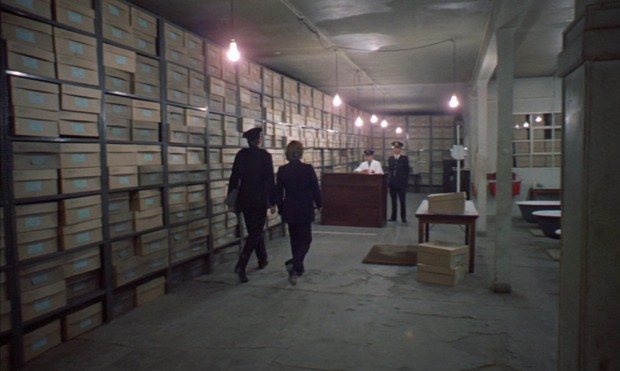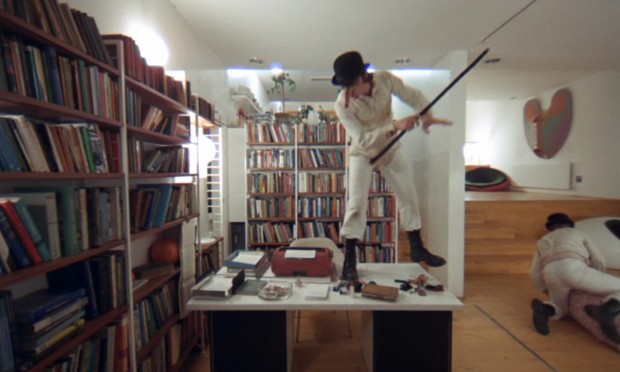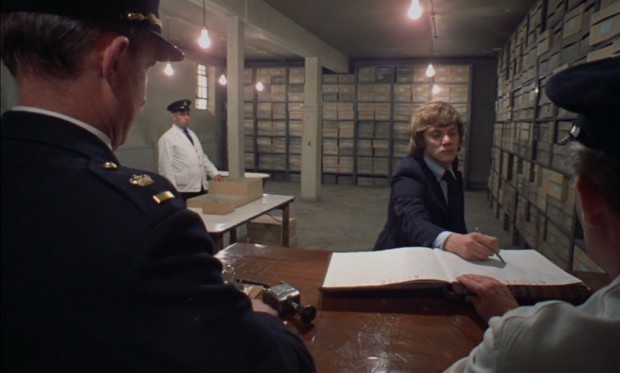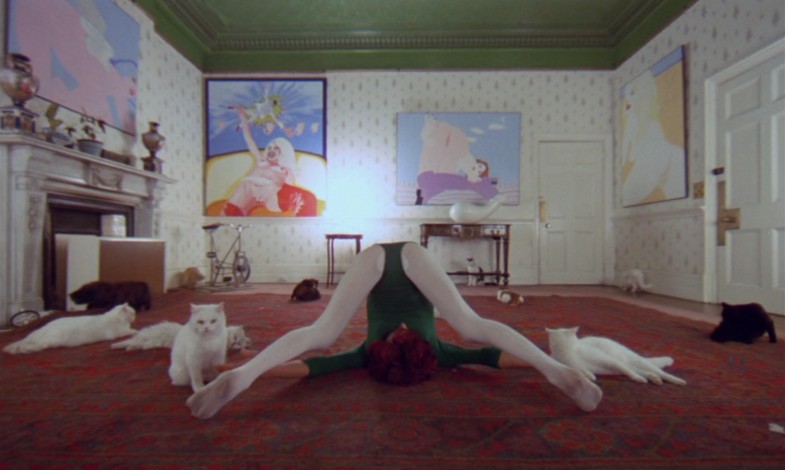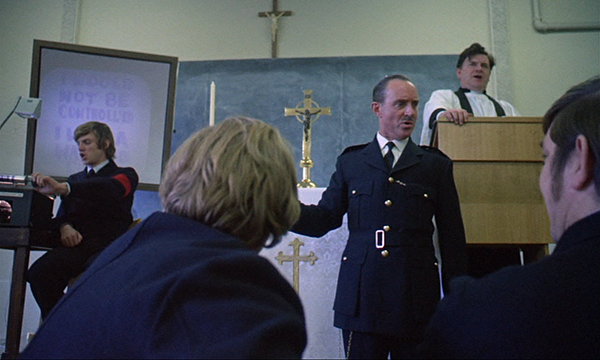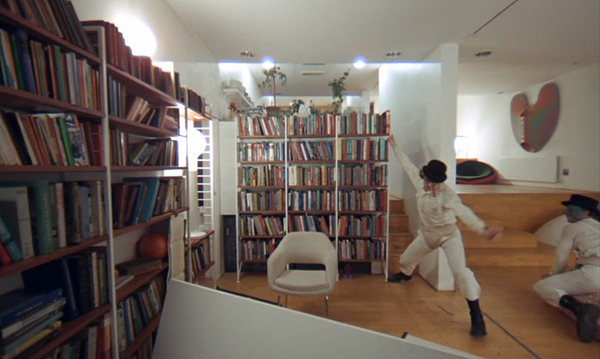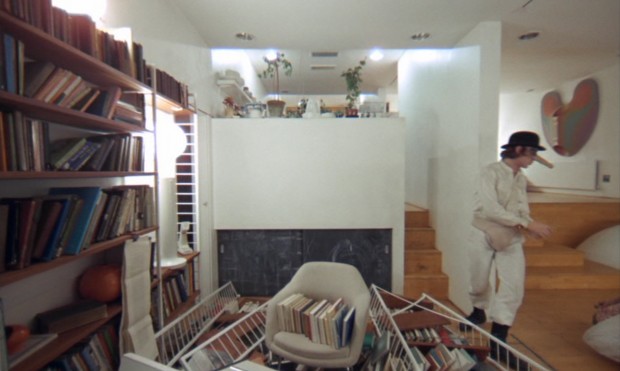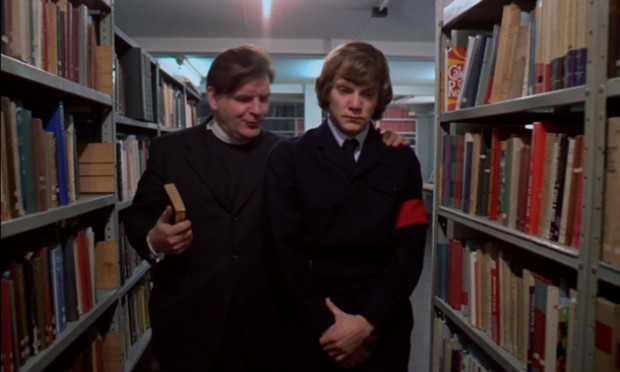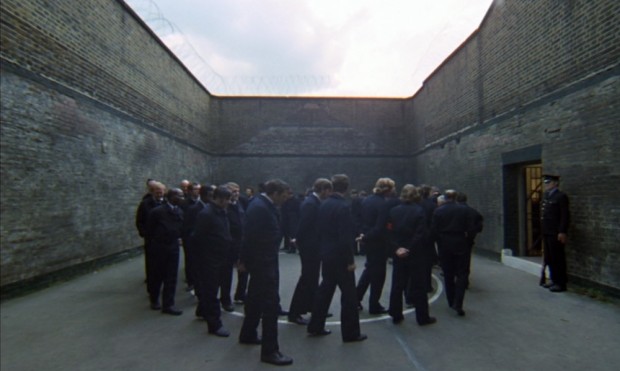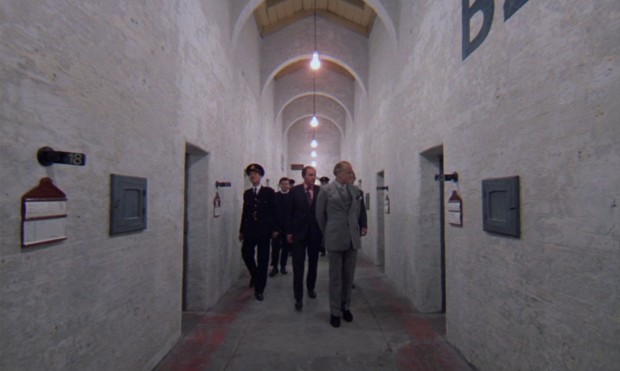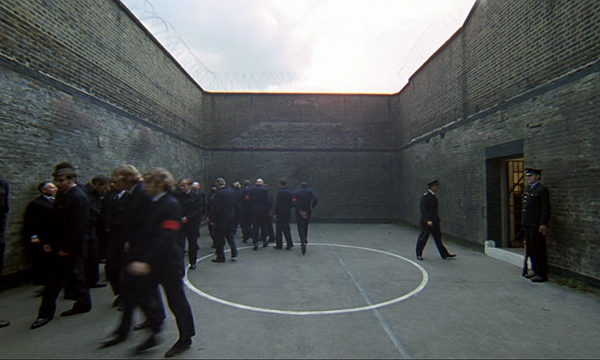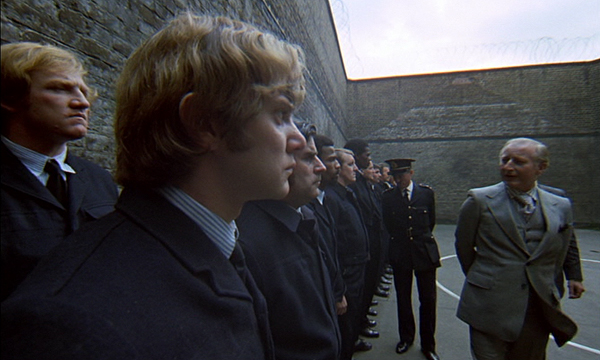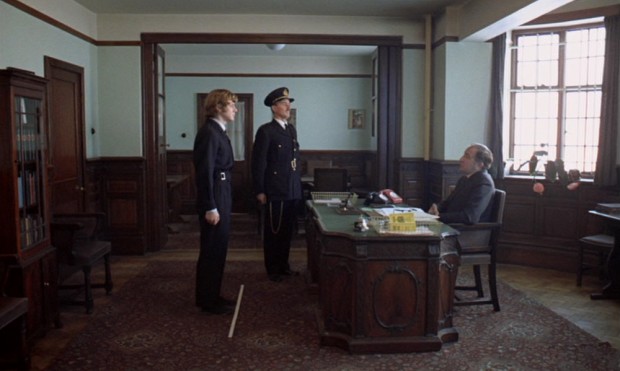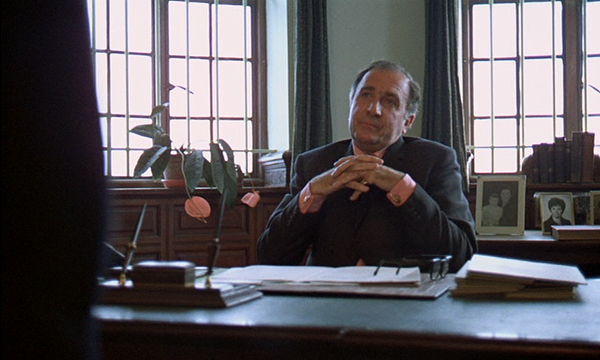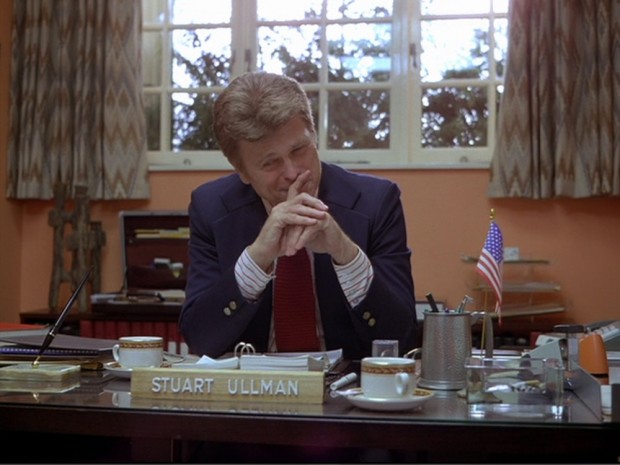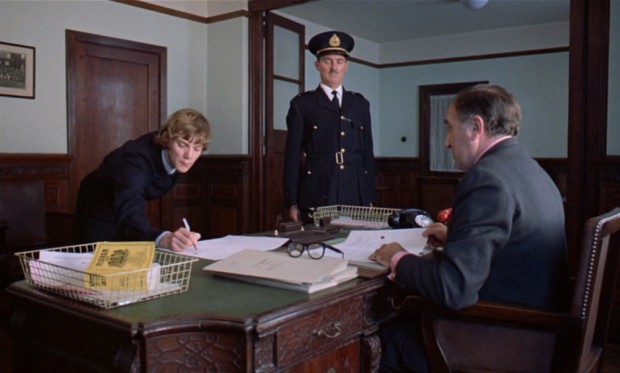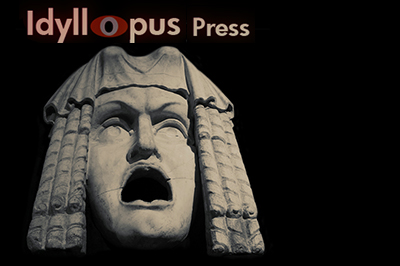STANLEY KUBRICK'S A CLOCKWORK ORANGE

Go to TOC for this film ( (which has also a statement on purpose and manner of analysis and a disclaimer as to caveat emptor and my knowing anything authoritatively, which I do not, but I do try to not know earnestly, with some discretion, and considerable thought).
PART FOUR
TOC and Supplemental Posts | Part 1 | Part 2 | Part 3 | Part 4 | Part 5 | Part 6 | Part 7 | Part 8 | Films Home
LINKS TO SECTIONS OF THE ANALYSIS ON THIS PAGE:
The Incarceration of Alex, Shots 265 through 283
Comparing the prison receiving area with HOME. Time arrest. White lines of restraint.
Kubrick's Eyes
The Prison Chapel, Shots 284 through 295
The twin blackboards of HOME merged in the single prison blackboard. The tale of Jacob and Esau. The red band.
Conversation on Free Will in the Prison Library, Shots 296 through 306
The necessity of the persecutor of the persecuted Christ. The catechism of revelation.
Alex Asks for the Experimental Treatment in Order to Get Out of Prison, Shots 307 through 313
The Minister of the Interior. The pyramid and circle in the exercise yard. On Pomp and Circumstance, Othello and Lodovico. Lodovico the humanist. The theme of false appearances and erroneous blame.On the literature on the desk in Alex's prison cell and that on the desk of the prison governor. "The Strange Old Camera" and its ability to revive the past.
The Prison Governor's Office - Alex Signs for the Ludovico Treatment, Shots 314 through 323
On the new view as opposed to the old eye for an eye.
THE INCARCERATION OF ALEX
COMPARING THE PRISON RECEIVING AREA WITH HOME - TIME ARREST - WHITE LINES OF RESTRAINT
265 Aerial view of the prison approaching from the rear. (47:19)
Mournful violin. An aerial view of a prison with five wings, zooming in on the prison yard with prisoners in blue walking its circular paths. The left blackboard in Alexander's home had shown squares while the right one had shown spirals. With the prison, we shall have endless spiral revolutions suggested through the exercise yard.
Though we've had other exterior views in the film, they have had a tunnel vision effect so that the broader world in which A Clockwork Orange takes place has been intentionally avoided. Now, though Alex is being shut away from society, we finally have our first broad perspective of the outside world, and yet, in these several aerial views, it is only that which immediately surrounds the prison.
ALEX (VO): This is the real weepy and like tragic part of the story beginning, oh my brothers and only friends.
266 Another aerial of the prison, approaching from the front. (47:34)
The exercise circle that was on screen right, now on screen left, is in use.
ALEX (VO): After a trial with judges and a jury, and some very hard words...
Shot 265 | Shot 266 |
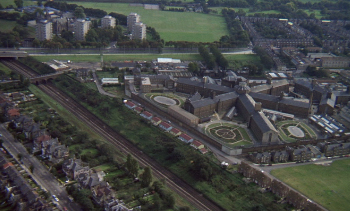 | 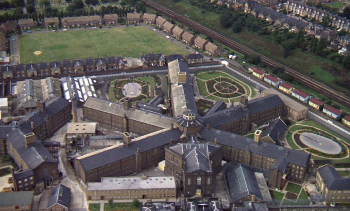 |
267 Closer aerial shot showing the circular exercise yard that is in use, zooming in on it. (47:39)
ALEX (VO): ...spoken against your friend and humble narrator, he was sentenced to fourteen...
268 Interior of receiving area in the prison.
We view several officers, two in white coats, standing in a large room lined with boxes, several bath tubs sitting in the open. Bare bulbs hang from the ceiling, keeping with bare bulbs being the usual lighting source throughout the film, though here they are reduced to their utilitarian status with no decorative allusions.
ALEX (VO): ...years in Staja number 84-F...
A bell rings.
ALEX (VO): ...among smelly perverts and hardened prestoopnicks, the shock sending my dada beating his bruised and kroovy rookas against unfair Bog in his Heaven, and my mom boohoohooing in her mother's grief, as her only child and son of her bosom, like letting everybody down real horrorshow.
We have heard a bell ring. One of the warders has gone to a door and opens it. Outside, beyond a barred door, we see Alex and a guard.
GUARD WITH ALEX: Morning, one up from Thames, Mister.
PRISON OFFICER: One in from Thames, Sir.
CHIEF GUARD (off screen): Right! Open up, Mister!
PRISON OFFICER: Yes, sir.
The prison officer opens the gate. The camera zooms in on Alex and the guard to whom he's handcuffed as they enter then pans screen right as Alex is marched in his trim blue suit to the receiving desk. They stop before a white line.
With the initial interiors--the Karova milk bar, the tunnel in which the Irish bum was beaten, and HOME--interior architecture had been a fairly simple elongated rectangle suggestive of a tunnel with its deep perspective, though with HOME that space was split in two with the writer's office on one side and the museum-like space of the living area on the right. Here we again have the division of a deep space into two areas, as with HOME, the left area belonging to the numerous shelves housing the boxes that contain the effects of the prisoners, and the receiving desk, while on the right are four exposed claw-foot baths. Again, this is much like HOME where the desk and shelves with the books were on the left, and the pod-like receptacles for lounging were on the right. When Alex later returns HOME he will end up taking a bath there (he takes a bath here but we don't see it) and the bathroom will be immediately off the office, though on the left of it. Just as this is a prison, so will HOME be a sort of prison for Alex when the writer and his cohorts drug him, though he's immediately transferred to another place of incarceration from which he'll make his suicide leap in seeking an escape.
269 MS from behind the Head Guard's right shoulder, facing Alex and the guard. (48:29)
GUARD WITH ALEX: Good morning, sir. Here are the prisoner's committal forms.
CHIEF GUARD (taking the forms): Thank you, mister.
Inducted into H. M. Prison Parkmoor, Alex gives his name, his sentence of 14 years, and slightly, perversely grins when relating his crime was murder. The transfer taking place, he is brusquely and officiously ordered to address all first officers as Sir from now on. He's told he is now 655321 and is told it is his duty to memorize this number.
CHIEF GUARD: Name.
ALEX: Alexander DeLarge.
270 MS Head Guard and Receiving Officer from behind Alex's right shoulder. (48:37)
CHIEF GUARD: You are now in H.M. Prison Parkmoor, and from this moment you will address all prison officers as sir! Name?
271 MS from behind the Head Guard's right shoulder, facing Alex and the guard. (48:45)
ALEX: Alexander DeLarge, sir.
CHIEF GUARD: Sentence.
ALEX: Fourteen years, sir.
CHIEF GUARD: Crime?
ALEX: Murder, sir.
CHIEF GUARD: Right. Take the cuffs off him, mister.
The cuffs are removed.
CHIEF GUARD: You are now six double five three two one, and it is your duty to memorize that number. Thank you, mister. Well done.
The Chief Guard hands the committal papers back to the guard who had entered with Alex.
GUARD WITH ALEX (saluting): Thank you, Chief.
272 MS of Chief Guard and Receiving Officer from behind Alex's right shoulder.
The Chief Guard returns the salute.
CHIEF GUARD: Let the officer out.
Shot 269 | Shot 270 |
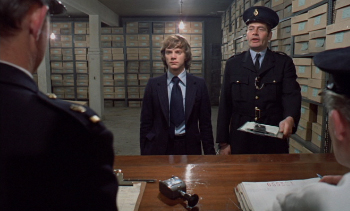 | 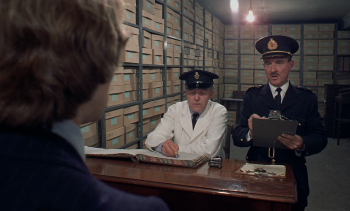 |
Shot 271 | Shot 272 |
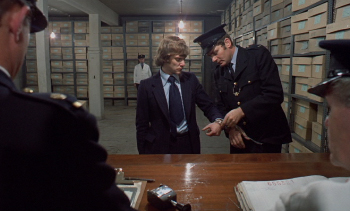 |  |
273 MS of Alex and the guard with him from behind the Chief Guard's right shoulder. (49:17)
PRISON OFFICER (who had let them in): Yes, sir.
The guard turns and retreats to the door where he is let out. As he does so, the receiving process continues for Alex. When told to empty his pockets on the desk, he steps forward and is reprimanded by the Chief Guard, asked if he's able to see the white line painted on the floor? Yes? Then he's told his toes belong on the other side of it. When he places some chocolate on the desk he's told to pick it up and put it down properly. The "stripy hole" is a place where people are reduced to numbers and a strict and meticulous order is enforced.
See the post Reflecting on 400 Blows and A Clockwork Orange for a comparison of these two films, as well as a French film known to have influenced If...
His belongings are catalogued as 1/2 bar chocolate, one bunch keys on a white metal ring, one packet of cigarettes, two plastic ball pens, one black, one red, one pocket comb, black plastic, one address book, imitation red leather, one ten penny piece, one white metal wristlet watch, Time Arrest, on a white metal expanding bracelet. He signs for his "valuable property" and is told he forfeits the chocolate and tobacco as he's now convicted.
With all the stolen wristwatches in Alex's drawer, it's interesting he seems to likely be wearing a cheap watch rather than one of the expensive ones. That it is called Time Arrest draws attention to the watch, and its relationship to the Clockwork Orange theme, as well as its name being a play on Alex's arrest. As if here, in prison, time is held in suspension with the divestiture of personal identification and freedoms.
Alex lived at 18-A Linear North, which in the book was only designated as the Municpal Flatblock 18a. Because of the addition of the word "linear" in Alex's address our attention is drawn to instances in which an issue is made of "line", such as the one about to occur when the white line will be pointed out to Alex behind which he must keep, a line which separates him from those with supposed free will, a symbol of his imprisonment. The white line will be made an issue again when Alex is about to leave prison, signing his papers for the Ludovico treatment in the governor's office. Just as the flatblock wasn't designated as "Linear North" in the Burgess book, neither was there mention of these lines.
Instead, in respect of lines, in Burgess' book there was the following:
...youth is only being in a way like it might be an animal. No, it is not just like being an animal so much as being like one of these malenky toys you viddy being sold in the streets, like little chellovecks made out of tin and with a spring inside and then a winding handle on the outside and you wind it up grrr grrr grr and off it itties, like walking, O my brothers. But it itties in a straight line and bangs straight into things bang bang and it cannot help what it is doing. Being young is like being like one of these malenky machines
My son, my son. When I had my son I would explain all that to him when he was starry enough to like understand. But then I knew he would not understand or would not want to understand at all and would do all the veshches I had done, yes perhaps even killing some poor starry forella surrounded with mewing kots and koshkas, and I would not be able to really stop him. And nor would he be able to stop his own son, brothers. And so it would itty on to like the end of the world, round and round and round, like some bolshy gigantic like chelloveck, like old Bog Himself (by courtesy of Korova Milkbar) turning and turning and turning a vonny grahzny orange in his gigantic rookers.
This is at the end of the book, when Alexander has a turn of heart with his simply becoming older and reflects on violence being the nature of youth.
CHIEF GUARD: All right. Empty your pockets.
Alex steps forward as he reaches into his pockets.
CHIEF GUARD: Are you able to see...
274 LS from low, Alex before the receiving desk behind which are the Receiving Officer and Chief Guard. (49:29)
The white line is between the camera and Alex.
CHIEF GUARD: ...the white line painted on the floor directly behind you, six double five three two one?
Shot 273 | Shot 274 |
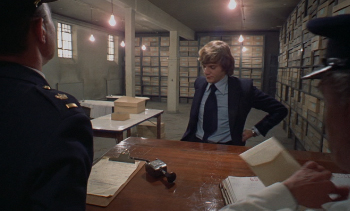 | 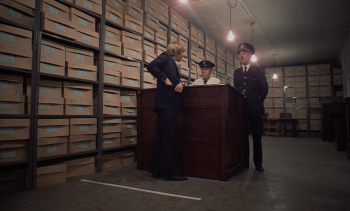 |
275 MS Alex from behind the Chief Guard's right shoulder. (49:36)
ALEX: Yes, sir.
CHIEF GUARD: Then your toes belong on the other side of it!
Alex stands behind the white line.
ALEX: Yes, sir.
CHIEF GUARD: Right, carry on.
Alex tosses a red wrapped bar of chocolate on the desk.
CHIEF GUARD: Pick that up and put it down properly!
Alex picks it up and places it down primly, asserting himself by punctuating the action with a tap of his finger on the chocolate, but nothing so bold as to merit a reprimand.
CHIEF GUARD (places the bar in an envelope): One half bar chocolate.
The Chief Guard speaks to the Receiving Officer who records Alex's belongings in a ledger.
CHIEF GUARD: One bunch of keys on white metal ring. One packet of cigarettes. Two plastic ball pens, one black, one red. One pocket comb, black plastic. One address book, imitation red leather. One ten penny piece. One white metal wristlet watch, Time Arrest, on a white metal expanding bracelet. Anything else in your pockets?
ALEX (pats down his pockets): No, sir.
CHIEF GUARD: Right, sign here for your valuable property.
The ledger is turned towards Alex, who picks up a pen and leans far forward from behind the white line to write his signature.
CHIEF GUARD: The tobacco and chocolate you brought in, you lose that as you are now convicted. Now over to the table and get undressed.
The Chief Guard has pointed to a table behind which stands the Receiving Officer who let Alex in. Before him is a large open box ready for Alex's clothing.
276 LS Alex stepping over to the table. (51:31)
Removing his jacket, Alex steps over to the table, standing on a mat before it. We see beyond the Chief Guard and Receiving Officer at the desk. The Chief Guard leaves the desk for the table, reading off a clipboard.
CHIEF GUARD: Now then, were you in Police custody this morning?
ALEX: No, sir.
PRISON OFFICER: One jacket, blue pinstripe.
CHIEF GUARD: Prison custody?
ALEX (removing his tie): Yes, sir. On remand, sir.
PRISON OFFICER: One neck tie, blue.
CHIEF GUARD: Religion?
277 MS Alex and the Prison Officer behind his table, boxing Alex's clothing, the Chief Guard beyond. (51:43)
ALEX: C of E, sir.
CHIEF GUARD (offended): Do you mean the Church of England?
ALEX: Yes, sir, the Church of England, sir.
CHIEF GUARD: Brown hair, isn't it?
ALEX: Fair hair, sir.
CHIEF GUARD: Blue eyes?
ALEX (removing his blue shirt): Blue, sir.
CHIEF GUARD: Do you wear eye glasses or contact lenses?
ALEX: No, sir.
PRISON OFFICER: One shirt, blue, collar attached.
CHIEF GUARD: Have you been receiving medical treatment for any serious illness?
ALEX (removing his boots): No, sir.
PRISON OFFICER: One pair of boots, black leather, zippered, worn.
CHIEF GUARD: Have you ever had any mental illness?
ALEX (removing his trousers): No, sir.
CHIEF GUARD: Do you wear any false teeth or any false limbs?
ALEX: No, sir.
PRISON OFFICER: One pair of trousers, blue pinstripe.
CHIEF GUARD: Have you ever had any attacks...
278 MS Alex from behind the Prison Officer receiving his goods, and the Chief Guard. (52:19)
CHIEF GUARD: ...of fainting or dizziness?
ALEX (removing his socks): No, sir.
PRISON OFFICER: One pair of socks, black.
CHIEF GUARD: Are you an epileptic?
ALEX (removes his underwear): No, sir.
PRISON OFFICER: One pair of underpants, white with blue waistband.
279 MS Alex 3/4 view from rear, the Chief Guard beyond. (52:28)
Alex fully stripped, the Chief Guard's eyes drop to his crotch.
CHIEF GUARD: Are you now, or have you ever been...
The Chief Guard's eyes meet Alex's.
CHIEF GUARD: ...a homosexual?
280 MS Alex from behind the Prison Officer and Chief Guard. (52:31)
ALEX (smiling): No, sir.
Alex's crotch is hidden by the table and the box top into which he's been placing his clothing, the Officer taking the items then and placing them in the box proper.
281 MS Alex 3/4 view from rear, the Chief Guard beyond. (52:32)
CHIEF GUARD: Right! The moth balls, mister!
We now observe in another box on the table some white moth balls.
PRISON OFFICER: Moth balls, sir.
The prison officer takes a hand full of moth balls and drops them in the box.
Shot 276 | Shot 277 |
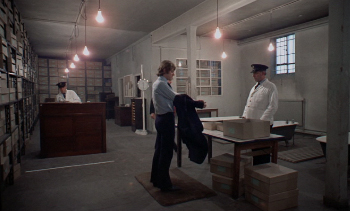 | 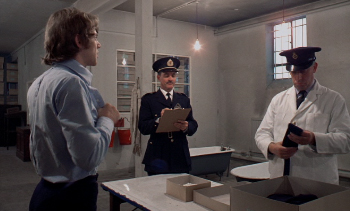 |
Shot 278 | Shot 279 |
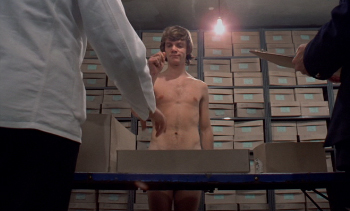 | 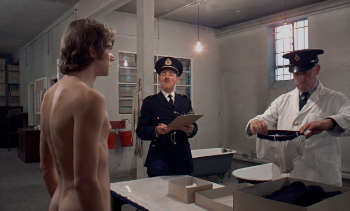 |
Shot 280 | Shot 281 |
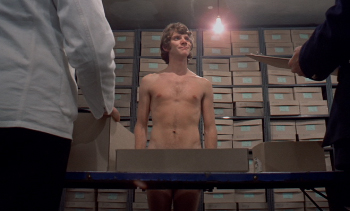 | 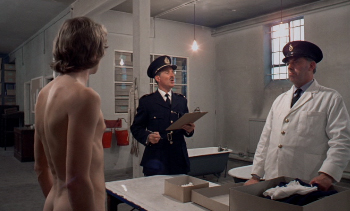 |
Shot 282 | |
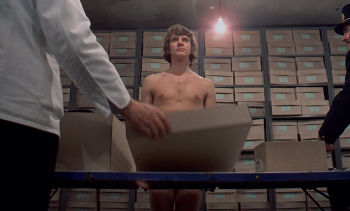 | |
282 MS Alex from behind the Prison Officer and Chief Guard. (52:36)
CHIEF GUARD: Now then, face the wall, bend over, and touch your toes!
The prison officer taking the box top and closing the box, Alex's pelvic region is partially shown. The Chief Guard, as he speaks, approaches Alex from the side. Alex turns so his left profile is to the camera, facing away from the Chief Guard. He begins to bend...
283 MS Chief Guard and Alex. 52:41
The Chief Guard kneels behind Alex, a pen light in his mouth, and spreading Alex's butt cheeks examines him.
CHIEF GUARD (removing the pen light from his mouth and pointing it at Alex's face): Any venereal disease?
ALEX: No, sir!
CHIEF GUARD: Crabs?
ALEX: No, sir!
CHIEF GUARD: Lice?
ALEX: No, sir!
CHIEF GUARD: Through there for a bath.
ALEX: Yes, sir!
He is sent over to the bath.
Kubrick's Eyes
First, Kubrick quite commonly has an examination of the eye, often with a light.
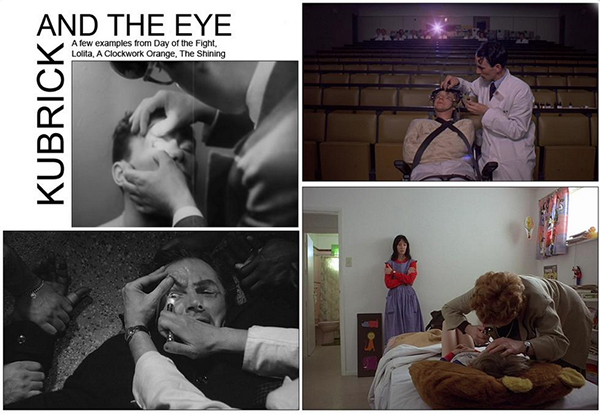
The boxer in Day of the Fight has his eyes examined in preparation for the fight. Humbert's eyes are briefly examined in Lolita when he becomes upset over his loss of Lolita, Danny's eyes are examined in The Shining after his vision. We should include as well the eye chart in Eyes Wide Shut and Mandy when her eyes are examined by Bill after her overdose.
The eye chart and the triangle formed by its letters is relevant for we are dealing with the Kubrick trademark of the light in the eye in conjunction with the triangulation. The examination of Alex by the prison guard is more akin to the image of the cat woman in her yoga pose. The light shines toward Alex's eye, but is also related to his posterior.
I will bring up the Cat Ballou poster again because of Kubrick injecting Cat Ballou in the film by way of the hanging scene, one of the pictures that came to Alex's mind as he listened to his Beethoven.

Because of that hanging, the direction I am moving in is the Hanged Man card of the tarot. In particular, the version in which the coins spill from the hanged individual. Remember, Alex's pockets have just been emptied.
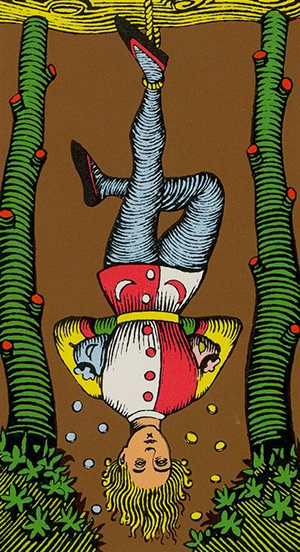
We also have the radiance of illumination around the head of some versions, for the card could be interpreted as the shedding of materiality as one moves into spiritual territory, sometimes accompanied by the idea of a period of tribulation.
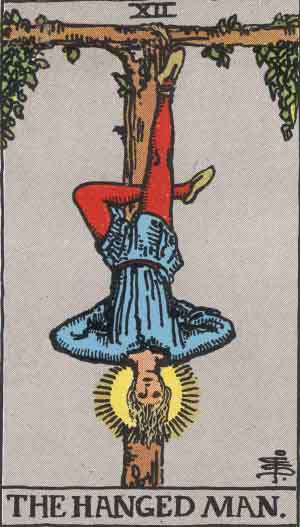
In The Shining Kubrick combines the triangle with choking, having in a poster, the encircled image of a child being choked surmounting a triangle (of sorts).
The Tarot of the Bohemians states:
Hieroglyphically the Lamed designates the arm, and therefore it is connected with anything that stretches, that raises, that unfolds like the arm, and has become the sign of expansive movement. It is applied to all ideas of extension, of occupation, of possession. As a last sign, it is the image of the power derived from elevation.
Divine expansion in humanity is produced by the prophets and revelation, and this inspires the idea of the revealed law. But the revelation of the law involve punishment for him who violates it, or elevation for him who understands it; and here we find the ideas of punishment, of violent death, voluntary or involuntary.
The Lamed, a simple letter, astronomically corresponds with the zodiacal sign of the Balance.
...The man's hands are tied behind his back, and the fold of his arms forms the base of a reversed triangle, of which his head forms the point. His eyes are open and his fair hair floats upon the wind. His right leg crosses his left and so forms a cross.
This young man is again the Juggler whose transformations we have already followed in the 1st, 6th, and 7th arcana.
Like the sun placed in the midst of the signs of the Zodiac (six on each side, the lopped branches), our young hero is again suspended between two decisions, from which will spring, no longer his physical future, as in the 6th arcanum, but his spiritual future.
The 12th arcanum fills the centre between the 6th arcanum (Wisdom) and the 15th (Fatality). These arcana represent the two women of the 6th arcanum, regarded in the spiritual sense.
This Hanged Man serves for an example to the presumptuous, and his position indicates discipline, the absolute submission which the human owes to the Divine.
Sometimes called a card of reversal, mystic expansion combines with suffering, for typically suffering occurs with that expansion.
Alex enters into prison, divested of all his material, worldly goods.
THE PRISON CHAPEL
THE TWIN BLACKBOARDS OF HOME MERGED IN THE SINGLE PRISON BLACKBOARD - THE USE OF THE TALE OF JACOB AND ESAU - THE RED BAND
284 CU Prison Chaplain. (52:55)
Quick cut shot to a close-up of the prison chaplain sermonizing passionately, demanding of the prisoners if they are going to be in and out of institutions like this or attend to the divine word and realize the punishments that await unrepentant sinners in the next world as well as this?
PRISON CHAPLAIN: What's it going to be, eh? Is it going to be in and out of institutions like this, though more in than out for most of you? Or are you going to attend to the divine word and realize the punishments that await unrepentant sinners in the next world as well as this?
285 MS Chief Guard rolling his eyes, looking up to the heavens, credulous, before a chapel window. (53:15)
PRISON CHAPLAIN: A lot of idiots you are...
The Chief Guard's attention is drawn to the prisoners, who we've yet to see, his expression changing to one of puzzled astonishment then repulsion.
PRISON CHAPLAIN: ...selling your birthright for a saucer of cold porridge, the thrill of theft, of violence...
We've here a reference to the story of the twins Esau and Jacob, Esau coming in one day from his hunt famished to the point of death, and selling his birthright to Jacob for a bowl of beans, so that the line of redemption and the house of Abraham came through Jacob instead, who was himself a deceiver but whose life was attached to a state of grace.
286 MS A prisoner pursing kisses and winking at Alex. (53:24)
PRISON CHAPLAIN: ...the urge to live easy. Well I ask you...
287 MS from behind the prisoner of Alex on the platform with the chaplain, regarding him blandly. (53:28)
PRISON CHAPLAIN: ...what is it worth when we have undeniable proof...
288 MS The prisoner, from behind Alex's left shoulder, again pursing kisses at him and winking. )(53:32)
PRISON CHAPLAIN: ...yes, incontrovertible evidence, that hell...
289 MS The prison guard staring on, aghast, indignant. (53:37)
PRISON CHAPLAIN: ...exists. I know! I know, my friends.
The prison guard averts his eyes.
PRISON CHAPLAIN: I have been informed.
290 CU Prison chaplain. (53:45)
PRISON CHAPLAIN: In visions! That there is a place darker than any prison. Hotter than any flame of human fire. Where souls of unrepentant criminals, sinners like yourselves...
An off-screen belch interrupts and the prisoners break into laughter.
291 LS The chapel. (54:01)
Now we're granted a long shot of the chapel filled with prisoners, Alex and the prison chaplain on the stage before them, the chaplain at his podium, another prisoner to screen right at a piano, and the chief guard and another on the left of the room before the windows. Between Alex and the chaplain is an altar with a cross on it. Behind them, upon the wall, is a large blackboard, above which is another crucifix.
PRISON CHAPLAIN: Don't you laugh, damn you! Don't you laugh! I say like yourselves - scream in endless and unendurable agony.
292 LS The chapel from behind the left shoulder of the pianist. (54:27)
We see the prisoners in the front rows, the Chief Guard, Alex and the chaplain from behind the pianist's left shoulder.
PRISON CHAPLAIN (rubbing his face): Their skin rotting and peeling! A fire ball spinning in their screaming guts! I know--oh, yes--I know...
A prisoner blows a raspberry and the Chief Guard steps forward maintaining order.
CHIEF GUARD (pointing): I saw you, nine two oh five three seven (920537), I saw you!
Shot 284 | Shot 285 |
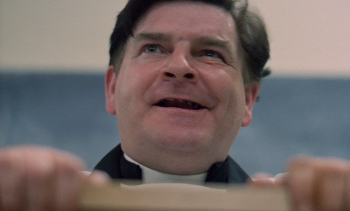 | 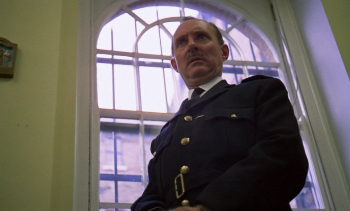 |
Shot 286 | Shot 287 |
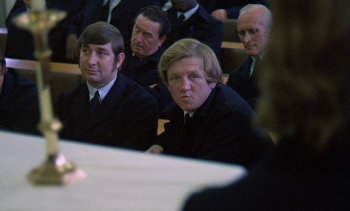 |  |
Shot 288 | Shot 289 |
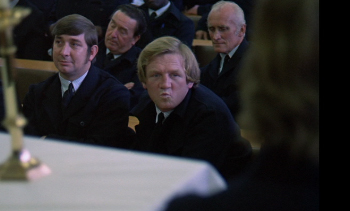 |  |
Shot 290 | Shot 291 |
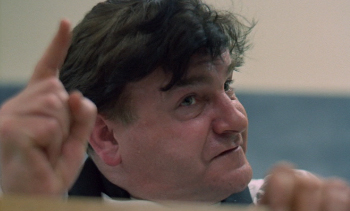 | 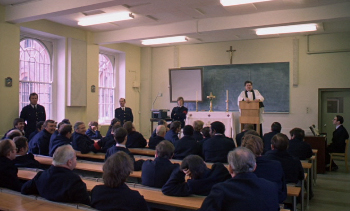 |
Shot 292 | |
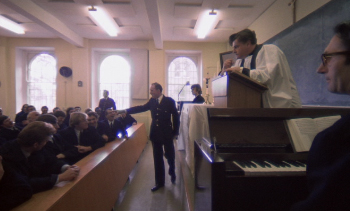 | |
293 MS Chief Guard from behind the shoulder of the prisoner who had been pursing kisses at Alex. (54:33)
PRISON CHAPLAIN (arm raised, trying to quiet the prisoners): Quiet! All right, you lot (?) we'll end by singing Hymn two five eight (258) in the Prisoner's Hymnal.
CHIEF GUARD: And let's have a little reverence, you bastards!
The Chief Guard leading in song, Alex works the overhead projector, cranking it through the handwritten words of "I Was a Wandering Sheep". He sings boldly as well.
I was a wandering sheep
CHIEF GUARD: Come on, sing up, damn you! Louder!
I did not love the fold I did not love my shepherd's voice. I would not be controlled.
CHIEF GUARD: Louder!
I was a wayward child, I did not love my home.
I did not love my Father's voice, I loved afar to roam.
294 MS Alex from behind right shoulder of the prisoner who was winking at him. (55:07)
As the second stanza is sung, Alex's voice-over enters.
ALEX (VO): It had not been edifying, indeed not, being in this hell hole and human zoo for two years now, being kicked and tolchocked by brutal warders, and meeting leering criminals and perverts ready to dribble all over a luscious young malchick like your story-teller.
295 MS From behind Alex, the blond prisoner who was flirting with him and his brunette pal.
Shot 294 | Shot 295 |
 | 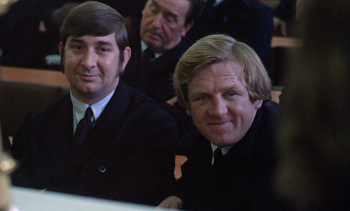 |
As noted previously, there had been a hidden blackboard at the HOME of Alexander which was revealed when Alex tore down the bookcase behind his desk:
The HOME blackboard was at the foot of the wall, by the floor, a white expanse above it, and above this a window area which opens onto the kitchen. One could make the case this is an inversion of the prison blackboard and altar arrangement, where the white expanse of the altar is below the blackboard, especially when one considers the kitchen as a place of food prep and that the altar is the place where the communion (bread and wine, body and blood) is prepared in a sanctifying manner. At least, that is something that comes to my mind but I'm not all that sold on it. One could find in the X on the blackboard the cross on the prison's altar, and in the overturned bars of the bookcases the bars of the prison. Again, I'm not certain of such direct linkages. But there is linkage between the HOME of Alexander and Alex's prison environment.
This hymn 258 is not specified in the book, instead it is hymn 435:
Weak tea are we, new brewed; but stirring make all strong...
Kubrick has chosen here a hymn to replace 435 that returns us, once more, to the idea of HOME.
Throughout his experience in prison, Alex wears a red band around his left arm. Whatever this means in the real life prison system, our first sight of it is in conjunction with the story of the twins Esau and Jacob and Esau selling his birthright. Esau is associated with the color red, and in another story of twins, when Tamar is giving birth the midwife wraps a scarlet thread (ShNI, scarlet, while another form of ShNI means to double) about the wrist of the child who first stuck his hand out the birth canal, but then that child, Zerah (rising or light, which I think is connected with the Zohar and mystic light), withdrew his hand, and the younger twin, Perez, was born first. The thing is that the thread may be scarlet but via the twins we have a doubling, a "second time", and we have in Kubrick's work many doublings and repetitions.
The Shining also made use of the story of Esau and Jacob, signaling the appropriateness of looking for such content with the use of music on Jacob. I've written a good deal on this in my analysis of The Shining and won't reduplicate the mass of it here, but, in a nutshell (into which one can't fit the subtleties of Kubrick's philosophical approach via his lens) with Esau and Jacob we have an exploration of duality and twin natures.
From my analysis on The Shining,
...the Hebrew shanah, ... at its root can mean not only shanah as in double, duplicate, fold, do a second time, transmute, disguise, but also to change. A similar shanah means to sleep. Page 30 of the "The Judicial Procedure of the Jews", a translation of the Talmud Tracate Sanhedrin, dealing with judicial procedure, particularly relating to capital punishment, has, "And he shall write a copy (mishneh) of this law, i.e. a law which was at a future time to be changed" and is footnoted that here is found a play on the double meaning of the root shanah, with to repeat and to change, the word mishnah, repetition, coming from shanah, which also means to study and review...
This duality will be of increasing concern as we get further into the story, Alex eventually and explicitly represented as an anti-christ figure, i.e. one who takes the place of Christ. This transpires through his becoming the perfect Christian.
Oh, wait, and before we leave this section, it repeats also certain elements of the milk bar. For the blackboards reminded of the black walls there, and Dim's blowing a raspberry after the woman singing the Ode to Joy, followed by Alex's swift whack of the cane on his leg in retribution and a bid to assert his vision of order, reminds of the raspberry blown as the chaplain preaches not on joy but the agonies of hell fire and dark, followed by the prison guard's attempt to impose order.
CONVERSATION ON FREE WILL IN THE PRISON LIBRARY
THE NECESSITY OF THE PERSECUTOR OF THE PERSECUTED CHRIST - THE CATECHISM OF REVELATION
296 LS The Prison chaplain in the library. (55:25)
Cut to the prison library, the camera dollies from right to left, the chaplain approaching the table where Alex sits reading the bible, what he will refer to as the Big Book. Looking again above at the image of the chapel blackboard above the altar, and the blackboard at HOME hidden by the bookcase, it is peculiarly appropriate that Kubrick now takes us to the prison library and Alex's immersion in the BIG BOOK. Not just any book, but the BIG book, a book perhaps that we can take here as being the prima materia of much of the literature of western civilization.
In the book, A Clockwork Orange, when Alex and his friends assault the writer and his wife, a specific attack is being made on intellectualism and literature. The first attack in the novel is on an individual, described as looking like a schoolteacher, who is carrying books. Then during the attack at HOME, Alex sees that the writer is working on a manuscript, A Clockwork Orange, and reads from it.
Then I read a malenky bit out loud in a sort of very high type preaching goloss: '--The attempt to impose upon man, a creature of growth and capable of sweetness, to ooze juicily at the last round the bearded lips of God, to attempt to impose, I say, laws and conditions appropriate to a mechanical creation, against this I raise my swordpen--' Dim made the old lip-music at that and I had to smeck myself.
The book forges a connection between the writer's home and Alex's religious education in prison with Dim's "old lip-music" at the writer's house interrupting Alex's reading, for Burgess has these same sounds also made at chapel service. Kubrick has elected to not have in the HOME scene Alex reading from the A Clockwork Orange manuscript, reserving the lip-music for Dim's interruption of the Ode to Joy at the milk bar, and then there was the raspberry in the chapel scene. Kubrick has instead added the instructional blackboard binding home and the chapel.
In the book, Alex discovers the writer's manuscript and reads in a "preachy" tone the portion protesting laws imposed on a creature of free will, laws more suited for a "mechanical creation", and later with the chaplain we have discussion on free will as versus pure mechanical reflex as we prepare to get into the Ludovico portion of the story.
That sentence Alex reads from the book reveals Burgess' intention of the meaning of the phrase, "a clockwork orange", it seeming to be the "sweetness" of man, as of an orange, oozing "juicily at the last round the bearded lips of God", but a mechanical orange upon which God feeds if it is strictly bound by laws rather than free will. And I guess then not so sweet. We should return to the orange circle that encloses the mouth of the painting that took the place of the cat woman's mouth when Alex struck her with the Rocking Machine.
ALEX (VO): It was my rabbit to help the prison charlie with the Sunday service. He was a bolshy great burly bastard, but he was very fond of myself, me being very young, and also now very interested in the big book.
Alex looks up to the heavens, his mouth moving as if in recitation of verse. The wind howls in his imagination...
297 MCU Alex from the front, gazing up in serene reverie. (55:50)
298 MCU Christ in his crown of thorns, carrying the cross, whipped by an as yet unseen Alex. (55:55)
...while begins a vision of the thorned Christ bearing the cross.
ALEX (VO): I read all about the scourging and the crowning with thorns...
The camera pans now to show it is Alex, in Roman togs, gleefully applying the whip, which is exactly what we would expect of Alex.
ALEX: ...and I could viddy myself helping in and even taking charge of the tolchucking and the nailing in, being dressed in the height of Roman fashion.
Alex's delight in imagining himself as the persecutor of Christ solidly introduces that if there is to be a persecuted Christ then there must need be a persecutor.
299 MCU Alex from the front, gazing up in serene reverie. (56:24)
Alex closes his eyes as a sound of whinnying horses enters his daydream.
300 MS A Roman battle scene, Alex cutting the throat of an enemy soldier. (56:30)
ALEX (VO): I didn't so much like the latter part of the book...
301 MCU Another shot of Alex in battle, engaging in sword combat with another soldier. (56:40)
ALEX (VO): ...which is more like all preachy talking than fighting and the old in-out.
302 MS as Alex is victorious, slicing and killing the enemy then engages another soldier. (56:43)
ALEX (VO): I like these parts where these old yahooties tolchok each other and then drink their Hebrew vino...
303 CU Alex, reclining, eating grapes. (56:48)
Cut to Alex opening his mouth wide to receive some grapes, the camera zooming out to show him luxuriously reclining between three bejeweled and bare breasted women, one fanning, one feeding him grapes, the third gazing off into the distance. These would be odalisques, as written of in section two pertaining to the paintings of the women.
ALEX (VO): ...and getting on to the bed with their wife's handmaidens. That kept me going.
304 MCU Alex deep in his daydream, eyes shut. (57:20)
The chaplain interrupts, entering from the left, placing a hand on his shoulder, showing long unkempt fingernails. Alex opens his eyes.
PRISON CHAPLAIN: Seek not to be like evil men...
Shot 297 | Shot 298 |
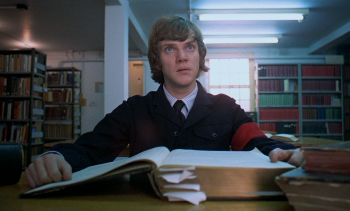 |  |
Shot 299 | Shot 300 |
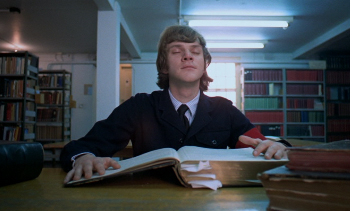 | 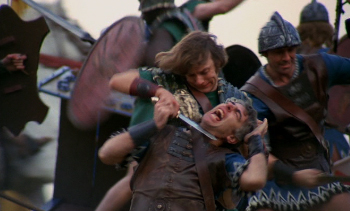 |
Shot 301 | Shot 302 |
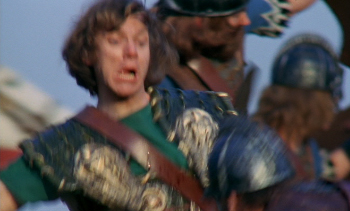 | 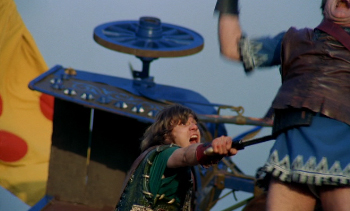 |
Shot 303 | Shot 304 |
 | 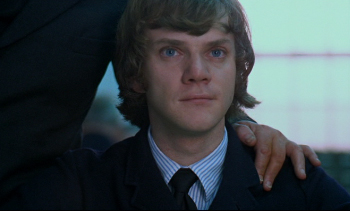 |
Shot 305 | |
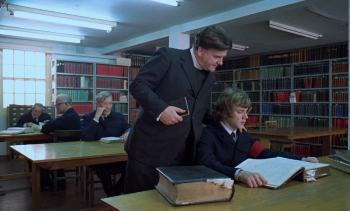 | |
305 MS The Prison Chaplain and Alex showing now the screen right view of the library. (57:27)
As the chaplain reads aloud, Alex joins in.
PRISON CHAPLAIN: ...neither desire to be with them, because their minds studyeth robberies and their lips speak deceits.
The chaplain has read Proverbs 24:1-2 over Alex's shoulder, which is highly unlikely as Alex is turned to the end of the big book.
Alex continues, reciting Proverbs 24:10.
ALEX: If thou lose hope, being weary in the days of distress, thy strength shall be diminished.
This proverb insertion is another choice of Kubrick's, it not being in the book.
Of course, Alex latches on to the violence in the "big book" and there's a lot of violence to be latched on to. It's a violent book. So it's interesting he's got it open to the Wisdom of Solomon rather than the story parts he loves, and, then again, he's not even got it open to the Wisdom of Solomon if the book is instead open at the very end where we would instead have Revelations.
None of these proverbs which are read in this scene were in Burgess' book.
PRISON CHAPLAIN (patting Alex's shoulder): Fine, my son. Fine, fine.
Retaining the Chaplain, who has begun to move off, Alex asks him hasn't he tried and done his best? He's never been guilty of any institutional infraction?
In other words, here in prison, he's followed the law to the letter, somehow able to quell his rebellious nature in the hope of finding favor and a quicker way out.
ALEX: Father, I have tried, have I not.
PRISON CHAPLAIN: You have, my son.
ALEX: I have done my best, have I not?
PRISON CHAPLAIN: Indeed.
ALEX: I've never been guilty of any institutional infraction, have I, Father?
PRISON CHAPLAIN: You certain have not, six double five three two one. You've been very helpful, and you've shown a genuine desire to reform.
Alex glances behind at the older prisoners at their studies and lowers his voice.
ALEX: Father, can I ask you a question in private?
PRISON CHAPLAIN: Certainly, my son. Certainly.
Alex having asked the Father if he can ask him a question in private, they retire to the bookstacks where the Father assumes that Alex is having problems with the urges that trouble young men deprived of the society of women. But Alex assures him it's nothing like that. Instead he's curious about the new treatment they're all talking about that gets you out of prison in no time and makes sure you'll never get back in again.
306 LS Alex rising and walking with the Prison Chaplain. (58:24)
PRISON CHAPLAIN: Is there something troubling you, my son? Don't be shy to...speak up. Remember, I know of the urges that can trouble young men deprived of the society of women.
As they walk back among the bookstacks, we are privileged to have one book stand colorfully and graphically out, one which likely has the title Catechism of Revelation, but as they walk on we only see the Cat... portion of the title, returning us to the cat/sphinx woman who was killed by Alex. But the full title of the book has bearing on what is going on as to catechize is to instruct by answers and questions (the idea of rote learning can be had with catechism) on what may be taken as the divine will or truth.
ALEX: Father, it's nothing like that. Father. It's about this new thing they're all talking about, Father. About this new treatment that gets you out of prison in no time at all, makes sure you never get back in again.
Taken aback by Alex's inquiry, the chaplain wonders how he heard about this.
PRISON CHAPLAIN: Where did you hear about this? Who's been talking about these things?
ALEX: These things get around, Father. Two warders talk, as it might be, somebody can't help overhearing what they say, then somebody picks up a scrap of newspaper in the work shops, and the newspaper tells all about it. How about putting me in for this new treatment, Father?
PRISON CHAPLAIN: I take it you are referring to the Ludovico technique.
ALEX: I don't know what it's called, Father. All I know is it gets you out quickly and makes sure you never get back in.
PRISON CHAPLAIN: That is not proven, six double five three two one. In fact, it's only in the experimental stage at this moment.
ALEX: But it is being used, isn't it, Father?
PRISON CHAPLAIN: It has not been used in this prison yet. The governor has grave doubts about it and I have heard that there are very serious dangers involved.
Alex isn't to be deterred. He insists he doesn't care about the dangers.
ALEX: I don't care about the dangers, Father. I just want to be good. I want for the rest of my life to be one act of goodness.
PRISON CHAPLAIN (gently): The question is whether or not this technique really makes a man good. Goodness comes from within. Goodness is chosen.
He emphasizes the word "chosen".
PRISON CHAPLAIN: When a man cannot really choose, he ceases to be a man.
ALEX: I don't understand about the whys and wherefores, Father. I only know I want to be good.
PRISON CHAPLAIN: Be patient, my son. Put your trust in the lord.
Looking heavenward, pious, Alex recites Proverbs 29:17.
ALEX: Instruct thy son and he shall refresh thee and shall give delight to thy soul.
PRISON CHAPLAIN: Amen.
They cross themselves.
The prison chaplain is one of the more physically repulsive of the characters in the film, his teeth so heavily stained they are lined in black, his fingernails ragged and unkept, his hair having sometimes the appearance of a ridiculous toupee. A clownish spiritual mentor, he bookends the Chief Guard, the physical disciplinarian, who also serves as a clown. Yet the prison chaplain is also the character perhaps most sympathetically treated. He is a father figure to Alex and is portrayed as sincere and earnestly interested in Alex's welfare, hopeful that Alex eventually experience true reform, and is at least concerned that he not be harmed.
ALEX ASKS FOR THE EXPERIMENTAL TREATMENT IN ORDER TO GET OUT OF PRISON
THE MINISTER OF THE INTERIOR - THE PYRAMID AND CIRCLE IN THE EXERCISE YARD - ON POMP AND CIRCUMSTANCE, OTHELLO AND LODOVICO - LODOVICIO THE HUMANIST - THE THEME OF FALSE APPEARANCES AND ERRONEOUS BLAME - ON THE LITERATURE ON THE DESK IN ALEX'S PRISON CELL AND THAT ON THE DESK OF THE PRISON GOVERNOR - THE STRANGE OLD CAMERA AND ITS ABILITY TO REVIVE THE PAST
307 LS The prison exercise yard, prisoners walking a circle. (1:01:17)
Cut to Alex and other prisoners walking an unending circle in the prison recreation area. Alex is paired with the larger blond individual who had been winking at him and throwing him kisses in the chapel.
308 LS Interior prison hall leading to cells. (1:01:29)
Farewell the neighing steed, and the shrill trump,
The spirit-stirring drum, the ear-piercing fife,
The royal banner, and all quality,
Pride, pomp, and circumstance of glorious war!"
"Pomp and Circumstance", which comes from the above quote from Othello, often used as a graduation march (and I suppose one could hazard that Alex is about to graduate from prison), plays as prison wing B is shown, a long hall with vaulted ceiling reminding very much of a church, the Minister of the Interior entering at the far end with the Prison Governor, the Chief Guard and others in attendance.
Inspecting the cells, the Minister passes over them all until coming to cell 23, opposite cell 17, in which something catches his interest, and he enters.
The floor before cell 23 rather conspires to make Cell 23 a point of interest in that here the red painted border on the floor breaks from symmetry and curves slightly outward, creating an arc that helps draw the eye to cell 23.
The number most prominent, however, in the frame is the number 18 cell which is in the foreground on screen left, after cell 17, and links us back to 18A Linear North whre Alex lives with his parents. Here we see prominently 18 of B block.
309 LS Interior of the cell, the minister entering. (1:02:09)
Inside the cell we see, on a desk, a bust of Beethoven, which is what has caught the Minister's eye. He picks up the bust and looks at it then places it back down on a magazine. A mustard colored book beside it reads "Great British Drivers" with a picture of a sports car on the cover much like the Durango 95 Alex had driven HOME. Placing the bust down down, his gaze moves up to the many pin-up pictures of partly clad women on the wall beside a crucifix. He turns to leave, then his eye is caught again by a portrait of Beethoven on a corner shelf. As he exits, we notice the locks of the prison door and are perhaps reminded of the door to Alex's bedroom at home and its locks, which were to keep people out. These, of course, keep people in.

I've borrowed the above image from Amazon.
We shall later see on the Governor's desk an almanac which is identified at the following link as the Wisden Cricketer's Almanack for 1970. The almanac is the same color as the "Great British Drivers" book on the desk in the prison cell.
Another publication on the desk in the prison cell is Uncanny Tales issue 143, from 1963, the cover showing a photographer's developing tray, and the developing photo of a train running into a wagon on a track. "Holy smoke! I've photographed something that happened a century ago!" reads a dialogue balloon, with the accompanying text, "What amazing power did it have which allowed it to photograph the long dead past? Find out in 'The Strange Old Camera!'" To the side of the developing tray is a small bottle of developer which looks much like the vial from which the Serum-114 will be extracted. There is also a clip that would be used for hanging the photo from a line for drying, and I realize that the clips used for holding the breasts to a line in one of the paintings at the cat woman's house may be another type of such clip as they are obviously not clips used for hanging clothes.
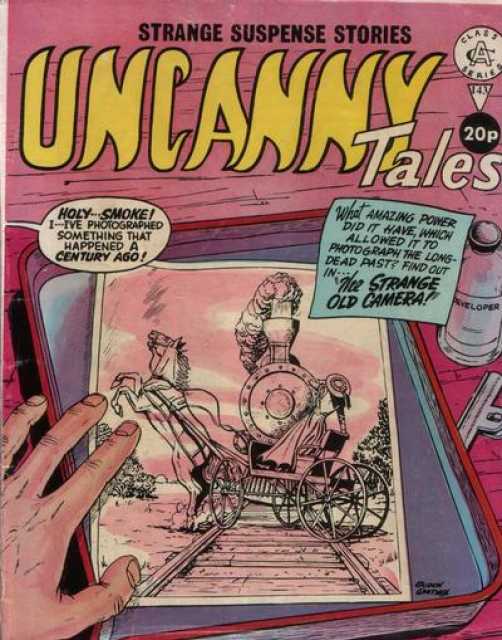
I've borrowed the above image from comicvine.gamespot.com.
Looking further I find on Comic Vine that "The Strange Old Camera", with the same cover, first appeared, it seems, in "Adventures into the Unknown", issue 104, on January 1, 1959.

Well, wait, "The Strange Old Camera!" also appeared as Uncanny Tales issue #117 in 1963. And Uncanny Tales issue #14 in 1963. And Uncanny Tales issue #69 in 1963? The script is given as by Richard Hughes. Pencils and inks were by Ogden Whitney. The story was 11 pages long. Other stories in the original 1959 #104 issue were (1) Pictures on the Wall with pencils and inks by John Buscema (oh, I recognize that name from Silver Surfer), (2) Mr. Hobbs' Vacation with pencils and inks by Emil Gershwin, and (3) Voyage into Nowhere! with pencils and inks by Ogden Whitney. Richard Hughes, the editor of Unknown Worlds, went under a number of pseudonyms in the issues for his writing contributions as, with the first 22 issues, "almost all stories were written by the same writer" (Wikipedia).
The train striking a carriage with horses on a track reminds of The Shining and the painting of the horse running down a railroad track toward an oncoming train which is seen subsequent Danny's first vision. In The Shining, that picture has to do with a movie that is also playing in the background beforehand, when Jack informs Wendy he's taken the job, which concerns the drilling of a tunnel for a new railroad, but it's obvious that Kubrick has also carried over the collision on the railroad idea from A Clockwork Orange to The Shining.
The idea that something from the past has been photographed in the present works in well with ideas I've written about concerning ZKR, remembrance, being expressed in The Shining, which I describe in this post. As Kubrick carries themes from movie to movie, he may also be expressing ZKR here. The train again appears in Eyes Wide Shut as a deja vu event, and I've a post on that here.
A train has previously appeared in this film, one blowing up having appeared in Alex's visions as he listened to Beethoven after the assaults at HOME.
I've already discussed in the section on the cat woman how several paintings on her wall depict past and ongoing events in Alex's life. This Uncanny comic book cover may also be a commentary on the nature of the paintings in the woman's exercise room, a linkage being the already mentioned photo drying clip.
Like Jack, in The Shining, Alex believes he knows what he's up to but he's on a seeming predetermined path to an ugly collision with destiny. The introduction of the railroad and train imagery here occurs when he's about to sign himself over for the Ludovico Treatment. Both men feel they're in control, but one could say that they're instead being railroaded by the forces of fate.
The set up is the appearance of an interest in Beethoven being considered an indication of higher intelligence and some cultural refinement. But Beethoven, for Alex, in the book as in the movie, represents violence. Something Kubrick doesn't bring into the movie but is instead represented by the deja vu elements is that in the book Alex had dreams, premonitions. He dreamt, prior Deltoid's visit, of his downfall, as did his father. And before learning of two deaths in the book (the Cat Woman and another person he'd beaten) he had dreamt of Beethoven.
We'll discover soon enough that the reformation technique that will be used on Alex is the Ludovico Technique. One can wonder if in Ludovico is a hint at Ludwig Van. But "Pomp and Circumstance" brings in Othello and Lodovico is a character in that play. A Venetian nobleman, he apprehends the murderous Othello, and also Iago, who had misled Othello, but who was characterized throughout as a good and honest man.
Othello is sometimes compared with Christ and Iago with the betraying Judas, yet at the end of the play, Othello speaking to Lodovico on how he should be remembered, compares himself to a "base Iudean" who threw a pearl away, rather than all his tribe, and a few lines later kills himself as he had once done "a circumcised dog". Though viewed by some as a Christ figure, Othello casts himself also in the role of Judas. He throws himself on guiltless Desdemona's bed crying, "I kiss'd thee ere I kill'd thee: no way but this; Killing myself, to die upon a kiss."
"Pomp and Circumstance" belongs to Kubrick's A Clockwork Orange. It's not in Burgess' book. As for Burgess' inspiration, I think instead his Ludovico Technique may have instead been a reference to Lodovicio Ariosto who coined the word "humanism".
With both "Pomp and Circumstance" and "The Thieving Magpie" we have Kubrick bringing in music that concerns false appearances and erroneous blame, or an unknown or deceptive agent behind the scenes influencing action. The sphinxes bring in oracle and preordained fate, but I can't help but feel that Kubrick may have spent considerable thought on lampooning and fingering the author himself as the crux of Alex's problems, he being, in effect, Alex, and also being Alex's god and designer of his fate.
310 LS The prison exercise yard. (1:02:09)
Cut to the prison recreation area again, the prisoners still walking their circle. (See my notes on this at the end of Section One.) We can assume that they have made at least one or two rounds since the last cut away, but when we return they are all only a step or two removed from where we left them for the inspection scene with the Minister of the Interior.
The Chief Guard exits and orders all to form two lines against the wall. The stage prepared, the Minister of the Interior then exits into the yard, followed by the chaplain and others.
CHIEF GUARD: (Can't understand what's being said.) Now, pay attention. I want you in two lines. Up against that wall facing this way. Go on, move! (Can't understand what's being said.) Stop talking. Prisoners ready for inspection, sir!
311 LS Doorway through which the Minister of the Interior exits into the exercise yard. (1:03:09)

The Chief Guard stands at attention, saluting, as the Minister and Governor and entourage exit and cross to screen left. The Prison Chaplain is the last of the entourage, the Chief Guard taking up the rear.
312 MCU of Alex, the Minister and entourage beginning their inspection of the prisoners at the far end of the line. (1:03:21)
Alex, in the line-up, the man he'd been paired with standing behind him, though they are very different in build, and the other man older and larger, distinct similarities between them are observed in color and in the styling of their hair, standing out from the others, so that the unnamed individual serves as a double of Alex.
MINISTER OF THE INTERIOR: How many to a cell?
GOVERNOR: Four in this block sir.
We were given a brief glimpse of the cell opposite Alex's when the Minister of the Interior exits Alex's cell, and it would have been impossible to fit four men to a cell as they were laid out, instead there seeming only to be bunks for two. This could, again, be a reference to dual natures.
MINISTER OF THE INTERIOR: Cram criminals together and what do you get? Concentrated criminality. Crime in the midst of punishment.
GOVERNOR: I agree, sir. What we need are larger prisons, more money.
MINISTER OF THE INTERIOR (laughing): Not a chance, my dear fellow. The government can't be concerned any longer with outmoded penalogical theories. Soon we may be needing all of our prison space for political offenders. Common criminals like these are best dealt with on a purely curative basis. Kill the criminal reflex, that's all. Full implementation in a year's time. Punishment means nothing to them, you can see that. They enjoy their so-called punishment.
As noted, a pyramid/triangle is viewed on a wall in the yard, this time a circle before it whereas quite often Kubrick has the circle at the triangle's apex. Other than when Deltoid (triangle) visited Alex at the police station and told him it was the end of the line, the last obvious trianglulation I recollect (well, besides Alex spreading his cheeks for the chief guard) was the cat/sphinx woman doing her yoga pose before Alex entered and she clobbered him with the bust of Beethoven and he killed her with the phallus sculpture, whereas in Burgess' book, she instead whacked him with a cane and he killed her with the bust.
Here, the Minister of Interior takes notice of Alex's Beethoven bust. We had also observed on the prison cell wall the numerous nudie pin-ups, and at the cat woman's house we'd had the numerous paintings of the nude women. Adding to these commonalities, the assault at the cat woman's house had occurred in an exercise room, just as here the prisoners are exercising.
Alex was "blinded" at the cat woman's house. Here, Alex sets his course so that he will have his eyes opened with the Ludovico treatment.
The Minister of the Interior passing by, Alex calls out that he's right!
ALEX: You're absolutely right, sir!
313 MS of Alex in the line-up from the opposite direction. (1:04:03)
CHIEF GUARD: Shut your bleeding hole!
MINISTER OF THE INTERIOR: Who said that?
ALEX: I did, sir.
MINISTER OF THE INTERIOR (returning to Alex): What crime did you commit?
ALEX: The accidental killing of a person, sir.
CHIEF GUARD: He brutally murdered a woman, sir! In furtherance of theft! Fourteen years, sir!
MINISTER OF THE INTERIOR (looking Alex up and down, enthuses): Excellent! He's enterprising, aggressive, outgoing, young, bold...vicious. He'll do.
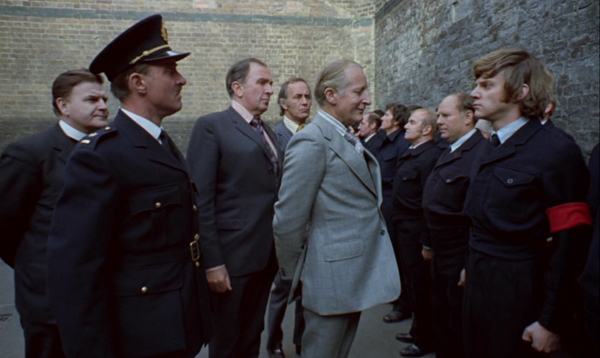
GOVERNOR (looking at his watch): Well, fine. We could still look at C block.
MINISTER OF THE INTERIOR: No, no, no. That's enough, he's perfect. I want his records sent to me. This vicious young hoodlum will be transformed out of all recognition.
ALEX: Thank you very much for this chance, sir.
MINISTER OF THE INTERIOR: Let's hope you make the most of it, my boy.
GOVERNOR: Shall we go to my office?
MINISTER OF THE INTERIOR: Thank you.
They exit screen left, the Chief Guard giving Alex a look of disgust, Alex broadly grinning, satisfied with his success.
THE PRISON GOVERNOR's OFFICE - ALEX SIGNS FOR THE LUDOVICO TREATMENT
ON THE NEW VIEW AS OPPOSED TO THE OLD EYE FOR AN EYE
314 LS the Prison Governor's office, he seated at his desk. (1:05:04)
Cut to the office of the governor, he seated behind his desk reading some papers. Before the desk is the restraining white line that had met Alex when he was introduced to prison world. There is a knock on the door.
GOVERNOR: Come in.
CHIEF GUARD (enters and salutes): Sir! Six double five three two one! Sir!
GOVERNOR: Very good, chief.
CHIEF GUARD (to Alex as he enters): Forward to the white line. Toes behind it! Full name and number to the Governor.
ALEX: Alexander DeLarge, sir. Six double five three two one, sir.
GOVERNOR (removing his glasses): I don't suppose you know who that was this morning, do you? That was no less a personage than the Minister of the Interior. The new Minister of the Interior.
315 MS The governor from behind Alex's right arm. (1:05:32)
GOVERNOR: What they call a very new broom.
There's a bit of resemblance between this scene and that of Ullman interviewing Jack in The Shining. Ullman's red and white stripe shirt is echoed in the red and white stripe of the flag on his desk. Here we have the warden's shirt cuffs echoed in the color of the flowers of the plant.
GOVERNOR: Well, these new ridiculous ideas have come at last, and orders are orders. But I may say to you, in confidence, I do not approve. An eye for an eye, I say. If someone hits you, you hit back, do you not? Why then should not the state, severely hit by you brutal hooligans, not hit back also? But the new view is to say, no. The new view...
316 MS The governor's office from the left corner of his desk. (1:06:02)
Cut to a view of the governor, Alex and the Chief Guard from beyond the left corner of the desk.
GOVERNOR: ...is that we turn the bad into good, all of which seems to me to be grossly unjust, heh?
ALEX: Sir...
CHIEF GUARD: Shut your filthy hole, you scum!
GOVERNOR: You are to be reformed.
317 MS The governor from behind Alex's right arm. (1:06:15)
GOVERNOR: Tomorrow, you will go to this man, Brodsky. You will be leaving here. You will be transferred to the Ludovico Medical Facility. It is believed that you will be able to leave state custody in a little over a fortnight.
318 The governor's office from the left corner of his desk. (1:06:28)
GOVERNOR: I suppose that prospect pleases you?
Alex hesitant to speak, having been yelled at when formerly questioned, the Chief Guard yells at him to answer.
CHIEF GUARD: Answer the governor when he asks you a question!
ALEX: Yes, sir. Thank you very much, sir. I've done my best here, I really have, sir. I'm very grateful...
319 MS The governor from behind Alex's right arm. (1:06:36)
ALEX: ...to all concerned, sir.
Now the governor slides forward papers for Alex to sign.
GOVERNOR: Sign this, where it's marked.
Shot 316 | Shot 317 |
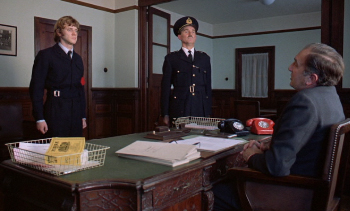 | 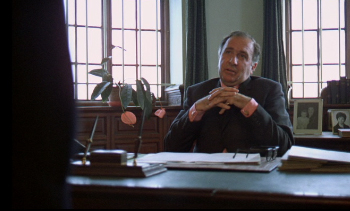 |
Shot 318 | Shot 319 |
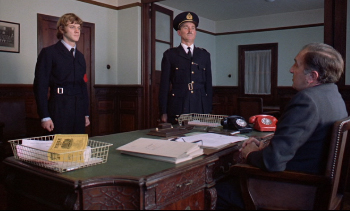 | 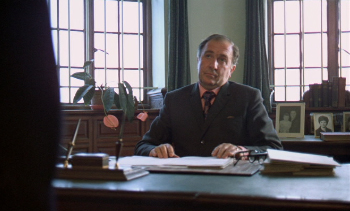 |
320 MS The governor's office from the left corner of the desk. (1:06:43)
Alex takes the pen given him by the governor and flips the paper over to read it.
CHIEF GUARD: Don't read it! Just sign it!
GOVERNOR: It says that you're willing to have the residue of your sentence commuted to submission to the Ludovico treatment.
Alex signs.
Each time Alex leans over to sign, the way the camera is positioned, we see only a part of his collar and his prison uniform transforms into an ecclesiastical one reminding of the prison chaplain's.
GOVERNOR (handing over another paper): And this.
321 MS The governor from behind Alex's right arm as he signs. (1:07:01)
GOVERNOR (handing over another paper): And another copy.
322 CU The chief guard looking on. (1:07:08)
323 CU Alex. (1:07:12)
Shot 321 | Shot 322 |
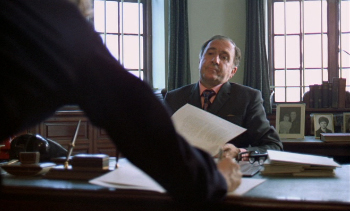 | 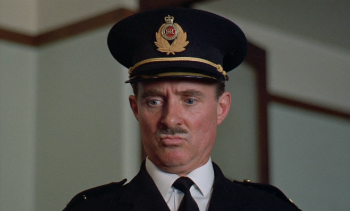 |
Shot 323 | |
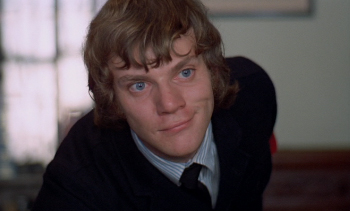 | |
Having signed the papers, Alex looks directly at the governor, and, smiling, plops his pen down on the desk, presuming himself victorious.
Approx 10,400 words or 21 single-spaced pages. A 80 minute read at 130 wpm.
Go to Part Five
Go to Table of Contents of the analysis
Link to the main TOC page for all the analyses
